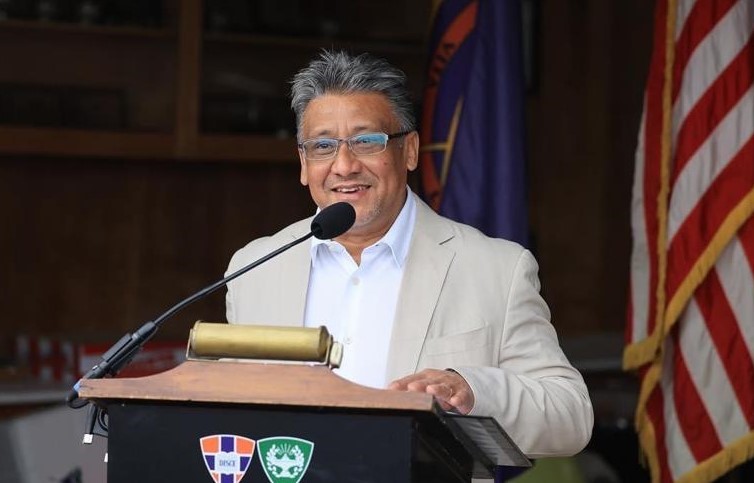Breaking the Silence: Empowering Lives and Promoting Suicide Prevention
This episode revolvers around the prevention of suicide in Nepal. With this difficult topic we cover how people can understand and help people who are struggling with negative thoughts.

Rabi Rajkarnikar is an accomplished individual with a remarkable track record in various fields. As the Founding Member of the Foundation for Suicide Prevention Nepal (FSPN) and President of the Nepal Equestrian Association, he has shown unwavering dedication to suicide prevention and sports development in Nepal. With a Bachelor's Degree in Economics and an Executive Masters Degree in Olympic Sports Education and Management, he brings a unique blend of expertise to his advocacy and awareness initiatives. We have come in coordination with "Galaxy This Morning Live" Show and taken an episode which was broadcasted on 12th July. The core aspects of the episodes are discussed below.
- What are the main reasons behind the action of suicide?
One of the primary reasons for suicide is mental health, but various other factors also play significant roles, including cultural, socio-economic, and global influences. The increasing globalization of ideas has brought about significant changes in societal norms, like LGBTQ marriages gaining acceptance. However, this cultural shift can also trigger conflicts and stress, impacting vulnerable individuals negatively. Additionally, the pervasive influence of media, coupled with the pressure to excel academically or professionally, can lead to feelings of failure and hopelessness. Inter-caste marriages, despite progressing attitudes, may still face opposition and social pressures. It is crucial to understand these complexities and address them compassionately through mental health support, awareness programs, and inclusive societal initiatives to prevent such tragedies.
- As the founding member of the suicide prevention Nepal what are your primary goals?
The idea was first started by him and his son with many people sharing their judgement of the decision to start an organisation which primarily consisted of other people's wellbeing. One important factor whistle making the decision was to make sure the close ones of families and friends family members to stop these thoughts, along this mindset proper research was conducted and contacted the Amercian suicide prevention foundation while also learning from the website and database they had to offer. While taking reference from the website of the American counterpart they tried to emulate the same success to the country of Nepal.
While talking about the foundation Rabi ji mentions one milestone, in coordination with the Lincoln school they conducted an advocacy session where students from various other schools attended. Along with the session they conducted a “grieving parents” to help family members to cope with the loss of loved ones.
- How important is it for an average person to grasp the significance of suicide prevention, and how effectively can we promote this idea? What are some common signs of suicidal tendencies?
In this day and age spreading a message is very easy with the resources we have in hand, one example is the youngsters who spread countless hours on their phone while there is a possibility to show them the accessibility. The more prepared you are in the field the more likely you are to guide and help people who are in trouble, be it from love, comfort, communication, medical intervention. Normally the common signs cannot be identified but small signs if noticed indicate the signs of these tendencies. Some signs can include body language, not being able to communicate with loved ones properly, homely circumstances and countless others.
- As a person who cannot identify these symptoms at a glance how can we identify these problems and deal with them at the moment?
There is a huge stigma attached to suicide, mentioning that taking ones life is considered as a criminal act. The first step is towards changing the policies of the government. Understanding the conversation while talking to someone can be one of the most effective ways in understanding the situation, always talking negatively or blaming oneself repeatedly, these are the most common aspects in a conversation and it often slips over the conversation. Understanding this we need to be more compassionate, sensitive and more common in Nepali people to stop body shaming. When identifying signs of suicide, directing individuals to seek professional help is undoubtedly the safest course of action. However, during the discussion, it was emphasized that offering the best support means assisting the person with personal care, so they don't feel isolated in their suffering. By doing so, we can demonstrate to them that they have someone to rely on during their difficult times.
- How should one seek professional help inorder to help people who are struggling with these thoughts?
There are many institutes in Nepal who are qualified to deal with these situations namely near Patan hospital they have an institute which consists of a hotline and have undergone advocacy training. The newer generation of Nepali students who have returned from abroad also have opened up new clinics to face these issues. One recommendation the speaker ha is to teach the three biggest institutes of Nepal (Army, Police and the APF) who can be taught to handle these situations and spread the importance of prevention of suicide.
- While the foundation for suicide prevention conducts many events for the betterment of the people, can you share some impact they have had on people?
The foundation's primary target is to help people develop their skills to help others in the field of mental health. What do you do in a situation like this? With the internet giving so much information to the people the foundation concentrates on a few points for example; if you are grieving or thinking of suicide or if you have lost a loved one whom to talk to or if you have attempted commit suicide, how to handle the situation and never come to situation like that ever again. They also offer expert advice from doctors to people who have completed PHDs for words of encouragement.


